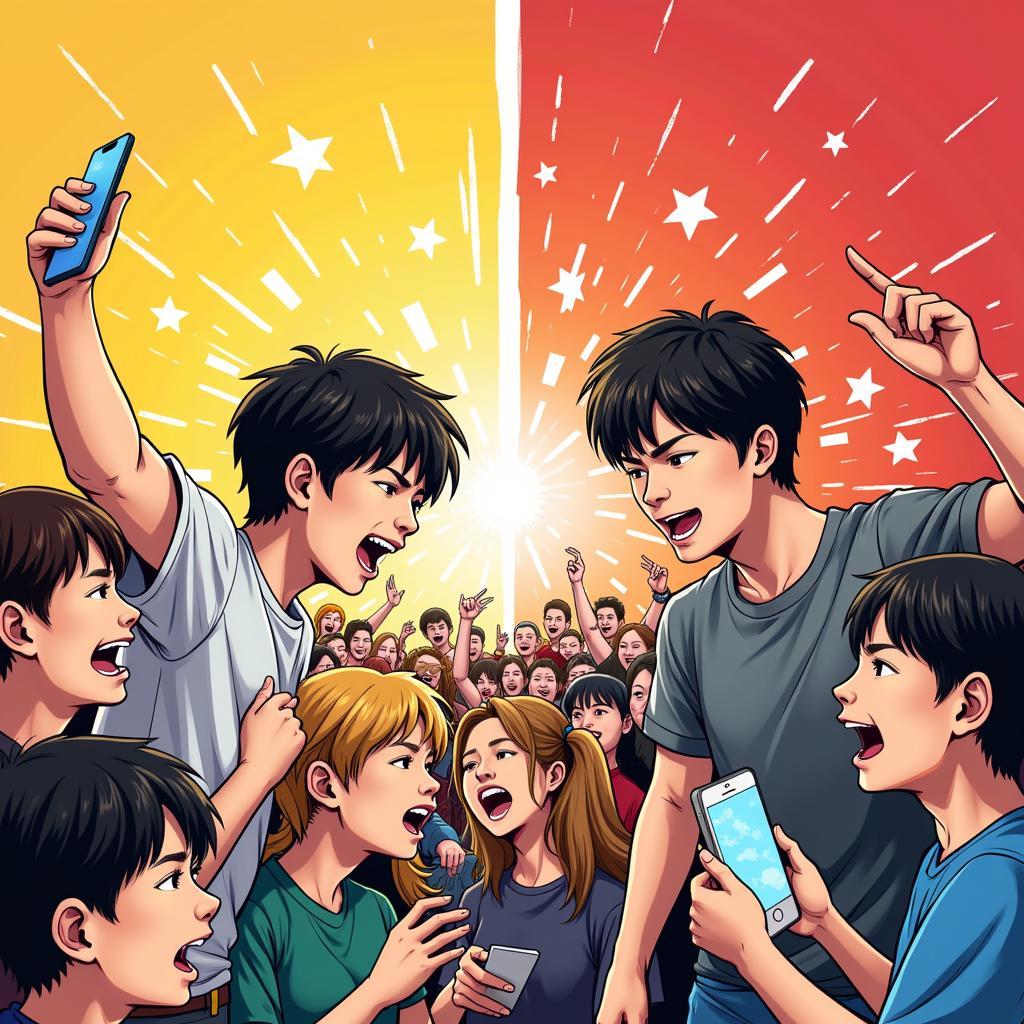The phrase “Fan Cuồng Tiểu Khải Anti Nguyên Nguyên” encapsulates a specific dynamic within the Chinese entertainment fandom. It speaks to a complex relationship where intense admiration for one idol, in this case, Karry Wang (Tiểu Khải), can be coupled with equally fervent opposition towards another, Roy Wang (Nguyên Nguyên), both members of the popular Chinese boy band TFBOYS. This phenomenon, though seemingly paradoxical, highlights the passionate and multifaceted nature of fandom culture, particularly within the online spaces of China.
Navigating the Complexities of Fandom Rivalry
The existence of fans who ardently support one member while actively opposing another within the same group might seem counterintuitive. After all, these idols are often presented as a united front, working together towards shared goals. However, this simplistic view overlooks the intricacies of fandom and the individual connections fans forge with their idols.
 chinese-idol-fandom-rivalry
chinese-idol-fandom-rivalry
Beyond Idolatry: The Roots of Anti-Fandom
Anti-fandom, in this context, isn’t necessarily rooted in hatred for the targeted individual. Often, it stems from a place of perceived protectiveness towards one’s favored idol. Some fans might believe that Roy Wang overshadows Karry Wang, hindering his individual success or receiving preferential treatment. This perception can fuel negativity towards the perceived ‘competition’, even if it’s not an intentional rivalry fostered by the idols themselves.
Another contributing factor is the parasocial relationship fans develop with their idols. They invest time, emotion, and often money in supporting these public figures. This investment can create a sense of ownership, leading some fans to believe they have a say in their idol’s career trajectory and interpersonal relationships.
The Power and Peril of Online Fandom
The internet has undeniably amplified both the positive and negative aspects of fandom culture. Online platforms provide fans with unprecedented access to their idols, fostering a sense of community and shared passion. However, this readily available platform can also be weaponized for negativity, spreading misinformation, and coordinating attacks against perceived rivals.
Cyberbullying and its Real-World Impact
The animosity between rival fan groups can manifest as cyberbullying, a serious issue with potentially devastating consequences. Hate comments, online harassment, and coordinated efforts to damage an idol’s reputation are unfortunately not uncommon within these online spaces. This behavior can significantly impact the mental health and well-being of the individuals involved, both the idols and the fans caught in the crossfire.
It’s crucial to remember that idols, despite their public personas, are real people with feelings and vulnerabilities. The anonymity offered by the internet shouldn’t be a shield for cruelty.
Moving Towards a More Respectful Fandom Culture
While the rivalry between different fan groups might seem insurmountable, fostering a more respectful and understanding online fandom environment is possible. It requires a collective effort from fans, entertainment agencies, and online platforms to promote positive engagement and discourage harmful behavior.
Encouraging Critical Thinking and Empathy
Fans should be encouraged to engage with their fandom critically and thoughtfully. Understanding the motivations behind their own feelings and acknowledging the perspectives of others can help bridge the divide between rival groups. Empathy plays a crucial role in fostering a more positive environment, reminding everyone that idols, despite their celebrity status, are deserving of respect and kindness.
Ultimately, the goal should be to cultivate a fandom culture where appreciation for one’s favored idol doesn’t necessitate tearing down another. Celebrating individual talents and contributions within a group, rather than fueling rivalries, will create a healthier and more enjoyable experience for everyone involved.

